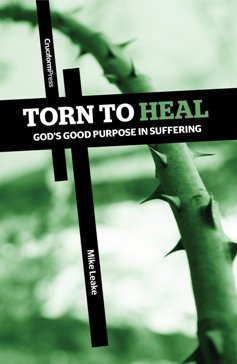 As a cofounder of Cruciform Press, I like to provide occasional updates, including thoughts on our recent releases. I try to mention titles shortly after they appear, so this one is a bit tardy. It’s a good book, though, and one I didn’t want to let pass by.
As a cofounder of Cruciform Press, I like to provide occasional updates, including thoughts on our recent releases. I try to mention titles shortly after they appear, so this one is a bit tardy. It’s a good book, though, and one I didn’t want to let pass by.
In Torn to Heal: God’s Good Purpose in Suffering, Mike Leake offers a “bare bones theology of suffering.” He does this by reflecting on the idea that “God uses the tearing of suffering to provide healing—a healing that goes far beyond the wound that is claiming our immediate attention.”
He begins with examples from the lives of Abraham, Hosea, Gideon, Joseph, and Job. He shows that God fulfills his promises, but does so in ways that seem (to us, anyway) counterintuitive. Then, in the heart of the book, he shows two ways Christians can get things seriously wrong: dualism and stoicism.
Both ways of thinking are faulty, both are partly correct, and both come in semi-Christian versions that run rampant in the church and do great harm. The dualistic Christian acknowledges that evil is something to strive against, but neglects the truth that God is sovereign over all things, even our suffering. The stoic Christian, on the other hand, may understand that God is sovereign, but will take a “grin and bear it” attitude toward suffering, without recognizing that God has a purpose for every trial.
After explaining the dangers of “deadly dualism” and “shallow stoicism,” Leake then offers the gospel view of suffering:
So the gospel agrees with the stoic in that God is sovereign and that we ought to humble ourselves under his mighty hand. And it agrees with the dualist in that there is real evil which God is in the business of eradicating. Yet at the end of the day the gospel proclaims (over against the dualist) an absolutely sovereign God and (over against the stoic) a God who incarnates himself and weeps for man’s suffering.
By uncovering the errors of dualism and stoicism, and then showing us the correct view of suffering, Leake equips us to spot faulty thinking in ourselves and others. And because he lays out everything so simply, we can remember and apply these truths long after we’ve finished the book.
Leake also admits that some things about suffering are in fact too hard to understand. When it comes to trials, it is tempting to want to explain everything, and we can end up spouting platitudes that bear little resemblance to biblical truth. So in places where the Bible doesn’t explain, Leake holds back as well. As he says, “[T]he Bible was not written to make us theologically comfortable or satisfy our curiosity. The Scriptures exist for a far more important purpose—to point us to the living God who provides eternal comfort. This God, after all, is infinitely beyond our ability to fully comprehend.”
So suffering is for our good, yet it can still make for terribly painful and difficult times. The challenge is to allow the biblical view of suffering to so permeate our hearts that we keep these two truths in balance. When we do that, we will retain a high view of God’s sovereignty, even as we face up to the real pain that suffering brings in this fallen world. Then, if we’re the sufferer, we can avoid despair and bring glory to God through the trial. And if we’re the one with an opportunity to offer comfort, we can avoid the unhelpful and even hurtful errors of dualism and stoicism, bringing instead a wisdom that’s honest, biblical, and encouraging.
This is a good book and a deep book, but it’s not an overwhelming book. The person in the midst of a trial might not be in a place where he or she can digest page after page of heavy theology on suffering. But because Mike Leake didn’t try to be exhaustive, he has brought us a book that can tangibly help those who need it most.
The idea behind Cruciform Press is to offer books that are theologically sound but concise and accessible. Torn to Heal meets this goal, and offers helpful counsel on a tough subject.
You can buy Torn to Heal at Amazon or direct from Cruciform Press.









